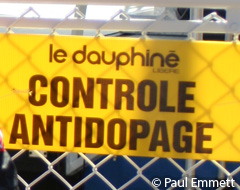Justice at two speeds
 Italian cycling legend Felice Gimondi has criticised the Italian sporting authority for its favouritism towards football. He argued that the Italian Olympic Committee (CONI) needs to be unbiased dealing with cycling.
Italian cycling legend Felice Gimondi has criticised the Italian sporting authority for its favouritism towards football. He argued that the Italian Olympic Committee (CONI) needs to be unbiased dealing with cycling.
“We cannot accept this theory of two different weights and measures. Cycling should be treated rightfully as any other sport,” Gimondi told Tuttobiciweb.com yesterday.
“It’s hard to forget when a great player [Fabio Cannavaro – ed.] was found positive and, one week after, is wearing the national team’s jersey. If that had happened to one of our guys [in cycling], we would have him banned for two years and removed from the national team for four years.”
Two separate doping incidents have clouded the career of Italian footballer Cannavaro. The night before the 1999 Europe Cup, a video was released that showed him being injected with a drug. The drug was later revealed to be Neoton (Phosphocreatine), not a banned drug as such, but one that helps the body produce muscular energy.
He failed a doping test in 2009 for cortisone. The CONI accepted his excuse that the cortisone was for a wasp sting and acquitted him.
Cyclists have had a harder time dealing with the CONI. Its head prosecutor Ettore Torri criticised cycling in an interview in October.
“I’m not the only one saying it. Lately, all of the cyclists I’ve interrogated have said that everyone dopes,” Torri said.
“The longer I’m involved in this, the more I marvel at how widespread doping is. And I don’t think it will be eradicated. Because it just evolves continuously. There are new substances coming out that can’t be tested for.”
Gimondi, who attend the presentation of Gianni Savio’s Androni team yesterday, believes Torri’s words are damning.
“I’d also like to reflect on the words uttered by the CONI’s head anti-doping prosecutor,” said Gimondi. “Extremely negative words, given all that cyclists do to race and all that the world of cycling does.”
Torri has prosecuted many Italian cyclists caught doping. He agreed with the International Cycling Union (UCI), who found suspicious values in Franco Pellizotti’s biological passport, and requested a two-year ban. The Italian anti-doping tribunal (TNA), though, ignored Torri’s recommendation and acquitted Pellizotti. The UCI has since appealed his case to the Court of Arbitration for Sport (CAS).
Gimondi is one of Italy’s cycling legends. He won the Giro d’Italia three times – in 1967, 1969 and 1976 – and the two other Grand Tours, the Vuelta a España in 1968 and the Tour de France as a neo-professional in 1965.
He also won cycling’s famous one-day races: Milano-Sanremo, Paris-Roubaix, Giro di Lombardia and in 1973, the World Championships. He tested positive twice during his career, first in 1968 and again in 1975.